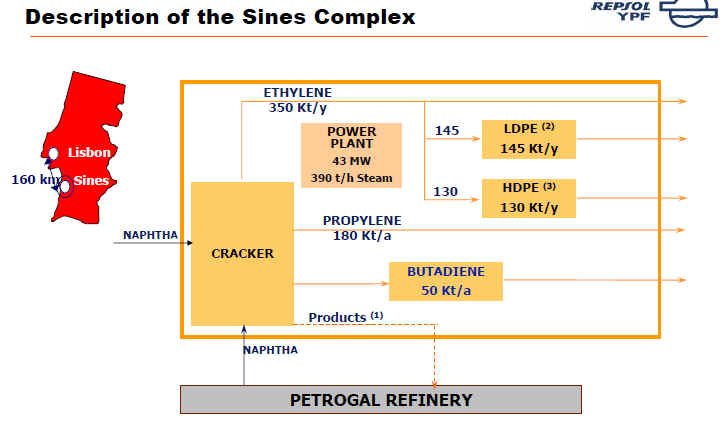
|
2006/7/27 Repsol
YPF 開始 Repsol presentation (企業概況、計画)
Repsol YPF invests
over Eur 600 million to double production at its Petrochemical
complex in Portugal
The Sines complex among the most advanced in Europe
・Three
new plants to be built and cracker capacity to be increased by
more than 40%.
・The
complex will have a production capacity of one million tonnes of
olefins and another million tonnes of polyolefins.
・Over
1,500 jobs will be created in the construction phase of the new
facilities.
・Sines
will enhance its added value by using all current production as
feedstock for the new polyolefin plants.
・Repsol
YPF consolidates growth in its natural markets in the Iberian
Peninsula and Southern Europe and complements its product
portfolio.
Antonio Brufau, Executive Chairman of Repsol YPF, accompanied by
Pedro Fernandez Frial, Executive Director of Downstream, will
meet today in Lisbon with the Portuguese Ministry of Economy and
Innovation, Manuel Antonio Gomes de Almeida de Pinho, to present
the company’s growth project for the Sines
Petrochemical Complex
in the 2006-2010 period, involving an investment of
over EUR600 million.
This project contemplates the construction of three new plants,
including a power station and two plants for the production of
new plastic products (linear polyethylene and
polypropylene)
at the current installations, as well as increasing the
capacity of the cracker currently in operation by more than 40%
to 570,000 tonnes/year. Current production at the
complex will increase twofold, boosting oleofin production to
nearly one million tonnes and polyolefin production to a similar
amount.
In Chemicals, since 30 September 2004 when Repsol YPF acquired the Sines petrochemical complex from Borealis, the company has invested approximately EUR50 million to increase production capacity at the cracker and high-density polyethylene plant and to improve the environmental and safety conditions of this facility.
Petrochemicals in Spain
The petrochemical business in Spain has a long history. Since its commencement, it has always been apart from the monopoly that dominated the oil business, making it easier for foreign companies to operate in this segment. There are four large petrochemical centres: Tarragona on the Mediterranean coast, Algeciras and Huelva on the western coast of Andalusia, and Puertollano in the interior. Most of the initial impetus of petrochemicals in Spain came from the Tarragona petrochemical centre and was largely due to the presence, still very active, of the most important companies in this specialty worldwide: ATOFINA, BASF, Bayer, Dow Chemical, Shell, etc., with other companies joining the ranks more recently and in other geographical contexts such as DuPont and Ube Industries. Foreign presence was also very important at the beginning in the Puertollano petrochemical centre: ARCO, Phillips, etc.
Spain's significant presence in this sector is mainly through CEPSA - aromatics - and Repsol YPF - olefinic compounds - with the former at the petrochemical centres created in the area surrounding its Algeciras and Huelva refineries, and the latter near its Tarragona and Puertollano facilities.Globalisation has led both companies to have a formidable presence abroad. Repsol YPF's production activities are concentrated in Argentina with Europe and the Mercosur countries as its most important markets, while CEPSA's international operations are located in Brazil and Canada and its production marketed in the five continents.
Location Operator Capacity
Kt ethylene/yearPuertollano Repsol 250 Tarragona Repsol 650 Tarragona Dow 600
One of the biggest
investments realized in the history of Portugal
Repsol has initiated the expansion of its Petrochemical Complex
in Sinex, Portugal
Today, Repsol's CEO,
Antonio Brufau, Portugal's Prime Minister, and Minister of
Economy José Socrates and Manuel Pinho, have
announced the initiation of the Sines Petrochemical Complex
expansion project. This important project is one of company's
main worldwide growth projects to be carried out in the Iberian
Peninsula and represents an investment of more than 1 billion
euros, one of the biggest investments ever to be realized in the
history of Portugal.
The expansion of
the Repsol Sines Complex contemplates building new lineal
polyethylene and polypropylene units that will triplicate the current petrochemical
complex, and will increase the current cracker capacity by
40%, until reaching a production of 570.000 tons of ethylene a year. In addition, a cogeneration plant
of 45 megawatts (Mw)
will be built, by this, the Sines Petrochemical Complex will
increase its efficiency and become one of Europe's most advanced
technological centres.
The production of
this new Complex will be mainly destined for export and will
exceed more than 1.2 billion euros per year, which will have a
positive impact when exporting petrochemical products from
Portugal. The future capacity of the polyethylene and
polypropylene factories will be equally 300 Kt/y, while the new cracker production
capacity will be 570 Kt/y. The Repsol Sines Petrochemical Complex
will end up with a production of almost a million tons of olefins
and polyolefin’s.